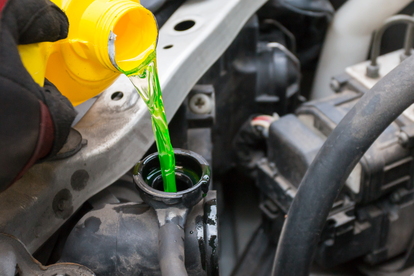Category:
Best Engine Coolant: Buying Guide

Like many automotive fluids, the best engine coolant isn’t a one-size-fits-all product.
Coolant contains additives that help it function in direct relation to the automotive manufacturer’s approved specifications. Using the wrong coolant in your vehicle can cause significant damage, overheating, and catastrophic failure.
Keeping your vehicle’s engine within an acceptable operating temperature range requires a coolant that aligns with the manufacturer’s recommendations for optimal performance. The guide below introduces several of the best engine coolants available from reliable suppliers like Cadence.
Read on to learn why engine coolant is essential and how you can narrow the field to find the best engine coolant for your car.
Why Does Selecting the Best Engine Coolant Matter?
Modern vehicles require engine coolant to function, including electric vehicles (EVs).
In a gasoline engine, coolant removes heat from the engine block to maintain optimal operating temperatures and avoid overheating. Engine coolant is preferable over water to achieve this goal because water leads to corrosion, which can shorten the engine’s operable lifespan.
Beyond resisting corrosion, coolant also contains additional properties that support a vehicle’s performance and longevity. When the antifreeze and water mix to create coolant, the antifreeze effectively lowers the water’s freezing point, allowing the mixture to flow at lower temperatures without solidifying.
Engine coolant also prevents mineral buildup, lubricates the water pump, and supports heater core performance.
What to Consider When Selecting Engine Coolant for Your Car
A high-quality engine coolant should meet industry standards, protect against corrosion, last longer between exchange intervals, and be designed for a wide range of temperature differentials.
Consider these factors when selecting the best engine coolant for your vehicle:
- Compatibility: Check your owner’s manual to determine the best engine coolant based on the make, model, and model year.
- Engine type: Coolant formulations can vary between diesel and gasoline engines.
- Coolant formulation: Beyond a 50/50 mix or concentrated coolant, formulations also include conventional and extended-life.
- Operating environment: The best coolant doesn’t freeze at extremely low temperatures and doesn’t boil at exceedingly high temperatures.
Commercial vehicles often see more severe operating conditions than their light-duty counterparts, which means they typically run hotter, for longer, and under greater strain. Engine coolants within these vehicles must meet that demand. When your vehicle goes the extra mile, there’s no compromising.
Common Types of Coolant
Automotive manufacturers often recommend coolant based on the formulation, which usually incorporates either organic or inorganic matter.
Here are the most common types of engine coolant.
Inorganic Additive Technology (IAT)
Many older makes and models rely on IAT coolants to prevent corrosion through silicates and phosphates. Often fluorescent green, these coolants must be changed more frequently than other types. A good rule of thumb is to change IAT coolants every two years.
Organic Acid Technology (OAT)
An OAT coolant can typically last just over twice as long as an IAT coolant, despite integrating organic acids that improve corrosion resistance.
Modern vehicles often call for OAT coolant, which can appear pink, red, yellow, orange, or purple. Unlike IAT coolant, OAT coolant doesn’t contain phosphates or silicates.
Hybrid Organic Acid Technology (HOAT)
A combination of IAT and OAT coolant formulations, HOAT offers engines the benefit of both worlds for improved corrosion resistance and longevity. Colors vary depending on the manufacturer.
Due to their advanced formulation, HOAT coolants often last for anywhere from 50,000 to 150,000 miles before they need to be replaced.
Top 5 Best Engine Coolants
The best engine coolant for your vehicle is the type recommended by the manufacturer.
However, when it comes to selecting between different brands, the following five engine coolants outrank the vast majority of those you’d find on the shelf of your local auto parts store.
1. PEAK Original Equipment Technology
The PEAK Original Equipment Technology lineup features individual engine coolants specifically formulated for Asian, European, and North American vehicles.
PEAK makes it easy to select the appropriate coolant based on your vehicle’s OEM, available in both diluted (50/50) and concentrated variants. These engine coolants can last up to five years or 150,000 miles.
2. Havoline Conventional Antifreeze/Coolant
The IAT formulation of Havoline’s Conventional Antifreeze/Coolant contains low amounts of silica and is available in concentrated and prediluted forms.
The green color gives away that this engine coolant is common among older vehicles. Havoline Conventional Antifreeze/Coolant is compatible with most older GM, Chrysler, and Ford models.
3. Chevron Delo Extended Life Coolant
Often red or orange, the Chevron Delo Extended Life Coolant is a long-lasting, ethylene-glycol-based formula.
Commonly used in heavy-duty diesel engines, Chevron Delo Extended Life Coolant contains advanced corrosion protection. It can also last up to 600,000 miles in most heavy-duty applications.
4. Valvoline MaxLife Universal Antifreeze/Coolant
Customers often choose Valvoline engine coolant based on its stellar reputation for quality. The MaxLife Universal Antifreeze/Coolant product is no exception, as it contains anti-corrosion additives perfect for high-mileage vehicles.
As the name suggests, this Valvoline engine coolant works in Asian, American, and European cars.
5. Zerex G-05 Antifreeze/Coolant
Zerex G05 Antifreeze/Coolant functions in both gasoline and diesel engines, typically in European and Asian vehicles.
An HOAT-type coolant, this product contains additives that protect against scale, hard water, and cavitation erosion. It’s also free from phosphates, silicates, and amines for additional protection.
Source Your Engine Coolant from the Experts at Cadence
Without the proper coolant, you run the risk of overheating your vehicle’s engine and potentially causing irreparable damage. Trust the experts at Cadence to guide you toward the best engine coolant for your application. Call us at 336-629-2061 to speak with a friendly and experienced staff member today!
Sources:
Inorganic vs Organic Coolant - What's The Difference? | GMB
Engine Coolants | The University of Tennessee